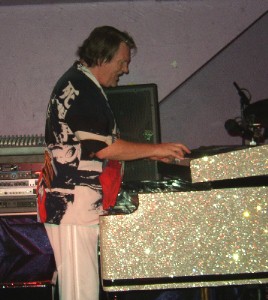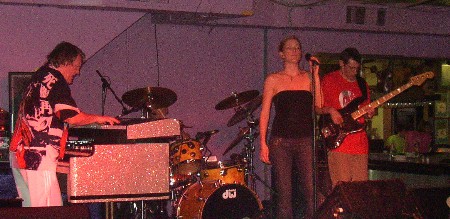The cover of Brian Auger’s 1975 album Reinforcements is a picture of him and his band, the Oblivion Express, with their young children in their arms and gathered around them. Auger himself is holding his one-year old daughter Savannah while his son Karma, the spitting image of his dad, jumps ecstatically in the foreground.
 Twenty nine years later, Brian Auger comes to the Jewish Mother in Virginia Beach Wednesday night with his kids still in tow. But this time they are grownup members of the band, Savannah on lead vocals, Karma behind the drums.
Twenty nine years later, Brian Auger comes to the Jewish Mother in Virginia Beach Wednesday night with his kids still in tow. But this time they are grownup members of the band, Savannah on lead vocals, Karma behind the drums.
“This band is absolutely tremendous,” he told me last week. “My kids aren’t in the band because they’re my kids. They’re in here because they’ll get up every night and kick your ass. I’m very proud of them. Chris [Golden] is an unbelievable bass player as well.”
Although Auger is once again using the Oblivion Express name, the current lineup is a return to the late ‘60s days of Brian Auger & the Trinity---keyboards, bass & drums with a female vocalist. That group, featuring singer Julie Driscoll, never got past cult status in America, but were quite popular in their native England and on the European continent.
“We had a lot of record success in Europe,” he remembers. “It all slid into sort of a pop frenzy a couple of times. We had a number one single in England. We opened all the major jazz festivals---Montreux, Berlin, Zurich, Rome, in ’68---following people like the Dizzy Gillespie Big Band.
“When the Trinity came to an end, what I was looking for was a band that could really step up and develop that music. At that time the record company wanted you to stay in the winning formula, and I really didn’t want to do that. You’ve got to move on when you can. I thought I was wading somewhat against the commercial tide, and I thought there was a risk that I was headed the quickest way to oblivion. So I called it the Oblivion Express!”
The early ‘70s Oblivion Express albums Second Wind and Closer to It! caught the attention of young rockers whose ears were being opened to jazz by the electric music of Miles Davis, Herbie Hancock, Chick Corea and John McLaughlin. But Brian Auger had already been working on a wedding of jazz and rock for many years. He’d achieved recognition as a jazz pianist early, winning the Melody Maker jazz poll in England as Best Pianist in 1964. But he also had a foot in the rock world. In fact, his keyboard playing gave The Yardbirds’ 1965 hit, “For Your Love,” its distinctive sound:
“We were actually in the same agency, the Yardbirds and myself. And they called up and said, ‘We need some help with this tune we’re recording…Could you come up to town now?’
“I turned up at the studio opposite the BBC on Upper Regent Street, and they played this tune for me. I said, ‘Yeh, that’s pretty easy. What do you want me to do?’ There was no organ; there was no piano in this studio either.
“They said, ‘We’ve only got this.’ And ‘this’ was this shape in the corner with a big cover over it. So I dragged the cover off of it and there was this two-tier harpsichord. I said, ‘You guys are kidding, right?’ They said, ‘That’s the only thing we have. We need a kind of an intro and a comp throughout the tune.’
“So I worked out something and we recorded the tune in about two hours. I left the studio thinking, I don’t know who’s going to buy a pop single with harpsichord on it.
“Boy, how wrong could I have been? It went to number one!”
Auger joined Steampacket, a blues band that featured three singers---Long John Baldry, Rod Stewart and Julie Driscoll. But management disputes and ego clashes got in the way, so Auger left with Driscoll in 1966 to pursue his vision of joining jazz and rock together. There were times when he questioned the pioneering musical direction he was traveling. (“I wondered whether I was just going up some side tributary and I’d be left up the creek without a paddle.”) But when he heard Miles Davis trying to forge a similar stylistic fusion, he was emboldened to continue on.
“When I heard In a Silent Way in 1970,” he says, “I realized how much rock influence there was in that album. Well, Miles was one of my absolute idols of all time. It was like a light going on: If it’s got to Miles, we’re definitely on the right path here. We’ve just got to push on. It gave me a lot of confidence.”
Auger’s best known composition is probably “Happiness is Just Around the Bend,” a song from his Closer to It! album in 1973. Like much of his music, it has a positive message, but it was another group that took it to the upper reaches of the pop charts.
“I suggested to RCA to do it as a single,” he explains. “They were an older kind of business affairs department, and they didn’t see it. And yet, there was another band on the label called the Main Ingredient. Those guys met me in the corridor and said, ‘Hey man, that song is great. What are you doing with it?’
“I said, ‘I was gonna put it out as a single, but the powers-that-be here have recommended that I don’t do that.’ So they said, ‘Well, what about us? Can we do it?’ And they had a big hit with it.”
Brian Auger’s most recent album is Auger Rhythms: Brian Auger’s Musical History, a two-disc set collecting music from his jazz piano days through the Trinity, the Oblivion Express and beyond, much of it previously unreleased. Wednesday night’s show at the Jewish Mother will also present a musical history of Brian Auger, this time as a family affair.
“I don’t think it gets any better than that,” he concludes. “One could say the reinforcements have indeed arrived!”

copyright © 2004 Jim Newsom. All Rights Reserved. Used by Permission.

